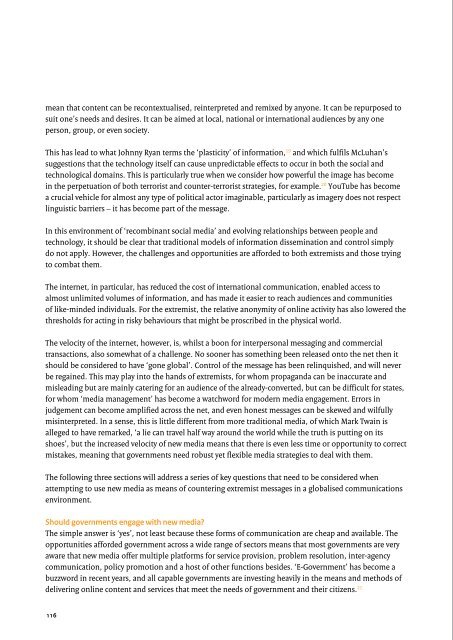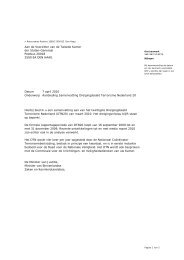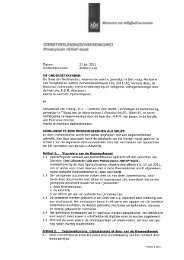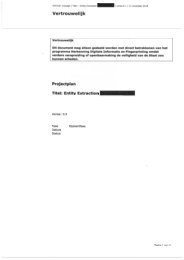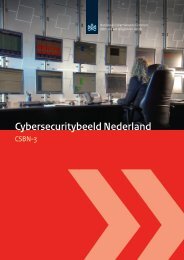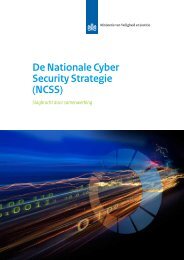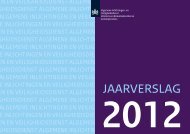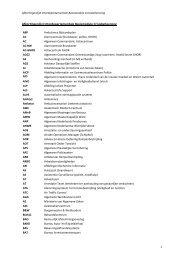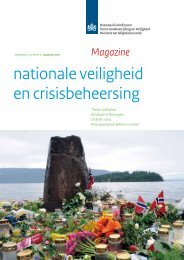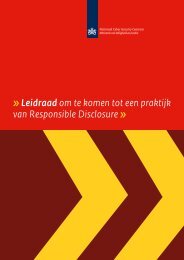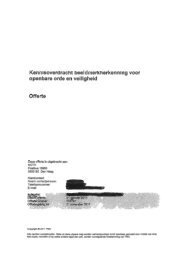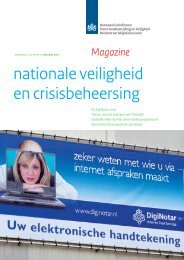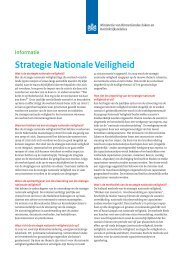Countering Violent Extremist Narratives
Countering Violent Extremist Narratives
Countering Violent Extremist Narratives
- No tags were found...
Create successful ePaper yourself
Turn your PDF publications into a flip-book with our unique Google optimized e-Paper software.
mean that content can be recontextualised, reinterpreted and remixed by anyone. It can be repurposed tosuit one’s needs and desires. It can be aimed at local, national or international audiences by any oneperson, group, or even society.This has lead to what Johnny Ryan terms the ‘plasticity’ of information, 19 and which fulfils McLuhan’ssuggestions that the technology itself can cause unpredictable effects to occur in both the social andtechnological domains. This is particularly true when we consider how powerful the image has becomein the perpetuation of both terrorist and counter-terrorist strategies, for example. 20 YouTube has becomea crucial vehicle for almost any type of political actor imaginable, particularly as imagery does not respectlinguistic barriers – it has become part of the message.In this environment of ‘recombinant social media’ and evolving relationships between people andtechnology, it should be clear that traditional models of information dissemination and control simplydo not apply. However, the challenges and opportunities are afforded to both extremists and those tryingto combat them.The internet, in particular, has reduced the cost of international communication, enabled access toalmost unlimited volumes of information, and has made it easier to reach audiences and communitiesof like-minded individuals. For the extremist, the relative anonymity of online activity has also lowered thethresholds for acting in risky behaviours that might be proscribed in the physical world.The velocity of the internet, however, is, whilst a boon for interpersonal messaging and commercialtransactions, also somewhat of a challenge. No sooner has something been released onto the net then itshould be considered to have ‘gone global’. Control of the message has been relinquished, and will neverbe regained. This may play into the hands of extremists, for whom propaganda can be inaccurate andmisleading but are mainly catering for an audience of the already-converted, but can be difficult for states,for whom ‘media management’ has become a watchword for modern media engagement. Errors injudgement can become amplified across the net, and even honest messages can be skewed and wilfullymisinterpreted. In a sense, this is little different from more traditional media, of which Mark Twain isalleged to have remarked, ‘a lie can travel half way around the world while the truth is putting on itsshoes’, but the increased velocity of new media means that there is even less time or opportunity to correctmistakes, meaning that governments need robust yet flexible media strategies to deal with them.The following three sections will address a series of key questions that need to be considered whenattempting to use new media as means of countering extremist messages in a globalised communicationsenvironment.Should governments engage with new media?The simple answer is ‘yes’, not least because these forms of communication are cheap and available. Theopportunities afforded government across a wide range of sectors means that most governments are veryaware that new media offer multiple platforms for service provision, problem resolution, inter-agencycommunication, policy promotion and a host of other functions besides. ‘E-Government’ has become abuzzword in recent years, and all capable governments are investing heavily in the means and methods ofdelivering online content and services that meet the needs of government and their citizens. 21The field of countering violent extremism is qualitatively and quantitatively different, of course, for reasonsof culture, ethnicity, ethics, and other politically charged considerations. If we ask the question again,‘should governments engage with new media to counter extremist narratives?’, the answer becomes,‘yes, but be realistic’. We cannot expect total success in countering extremist narratives using new media.Due to the ‘perpetual beta’ nature of online environments, 22 and the recombinant social media concept,total message control is both impossible and unwise. It follows that attempts to totally control themessage are also wasteful of resources.Corman et al. suggest that states adopt a perspective of ‘pragmatic complexity’, which acknowledges thatcontrol is ‘impossible and dysfunctional’, and that ‘failure is the norm’ – in terms of strategic objectives,at least. This perspective also suggests that participants in the system are mutually interdependent, andthat none are in control of the total communication process. 23 This presumes that the success of A’smessage depends not only on the message but also on what B thinks and does. Conversely, what B thinksand does is influenced by A’s behaviour and B’s expectations, interpretations and attributions withrespect to A. 24 This appreciation of cultural context implies that there is no one, unitary audience waitingto receive government’s chosen message; that relationship simply does not exist.Whilst failure is not a word that politicians like to hear, it may be one that policymakers can accept, andCorman and his colleagues are making the point that success is a relative concept. It may be far better totry many methods, and gain success that way, than to repeat old and tired counter-narratives through thesame old channels, hoping eventually to hit ideational pay-dirt. The sheer variation and proliferation ofnew media might be daunting, 25 but their resources and expertise mean that governments are actually verywell placed to exploit and experiment with these platforms, although their return on investment may wellbe lower than they might expect for traditional channels.This is a challenge for governments, but no reason not to proceed. In the United Kingdom, the Research,Information and Communications Unit (RICU) was founded in June 2007 as a cross-departmental teamcharged with exposing the weaknesses of extremist ideologies and brands, promoting and supportingcredible alternatives, and strengthening and protecting national security through communications.Although public information on RICU’s activities is scant, they are actively exploring the potential of newmedia platforms like blogs and social networking sites to propagate counter-narratives as part of thebroader countering violence extremism project as set out in recent iterations of the UK counterterrorismstrategies. 26We might add that governments have to engage in new media – after all, as the old game show catchphrasegoes, ‘You have to be in it to win it.’ Organisations like RICU occupy a grey area in the public consciousnessthat is usually regarded as ‘propaganda’, for right or wrong, and the necessities of public diplomacy andstrategic communication should not be left just to organisations with limited public transparency.We therefore make one further observation on the general involvement of government with new media.Overt government attempts to use new media – or traditional, mainstream media (MSM), for that matter– should be clearly ‘branded’. They should be open, not only to the source and intent of the Twitter feed,the Facebook group, or the YouTube channel, but also to the resulting comments and criticisms that suchinitiatives will inevitably attract. The well-respected Edelman Trust Barometer survey, in 2009 reaffirmedthat trusted organisations are ones that communicate openly, honestly, and regularly. They are also116 117


